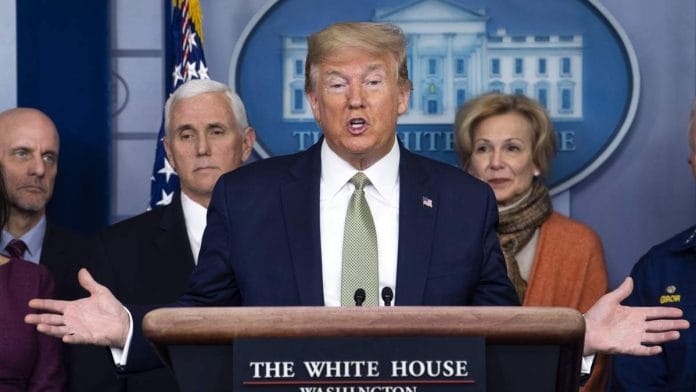New Delhi: From New Delhi to Washington, governments around the world are increasingly invoking urgent legal-constitutional provisions such as “wartime powers”, “state of emergency”, and “rule by decree”, as they respond to the unprecedented Covid-19 pandemic.
In hard-hit countries such as Spain, Italy, and France, a state of emergency has been declared. In Hungary, the parliament passed a bill that not only declared a state of emergency but also granted Prime Minister Viktor Orban the right to rule by decree.
In the US, the government is using war-time powers to force its firms to manufacture ventilators. And in India, the government has invoked the colonial-era Epidemic Act, 1897 to shore up powers of the central government, and even sought direction from the Supreme Court that no media outlet should print, publish or telecast anything on Covid-19 without first ascertaining facts from the government.
Not all nations have, however, invoked such emergency provisions. East Asian countries such as Singapore, Taiwan, Japan and South Korea, who have been lauded for providing the most effective response to the Covid-19 outbreak, have refrained from using such measures.
Here is a look at the varied government responses to the Covid-19 pandemic across the globe.
Also read: Wuhan is beginning to open with just one goal: Survival
Re-emergence of emergency powers
In the US, President Donald Trump’s administration has used the 1950s wartime-law “Defence Production Act” to force major firms such as General Electric to manufacture ventilators at a cost dictated by it. Even the country’s Department of Justice has written to lawmakers seeking a massive expansion in its powers to detain people without trial.
While the US federal government has now sprung into action by using such strong emergency measures, the country still has the highest number of cases in the world, with over 3 lakh infected.
Governments in Italy, Spain, and France — among the worst hit countries in Europe — declared a “state of emergency”, which was followed by their militaries stepping in to enforce the lockdown. The UK, which is the third worst hit country in the continent, has also initiated “emergency powers”.
But in countries such as Hungary and Azerbaijan, critics contend, the governments are using the emergency provisions to consolidate power.
“During a war, the liberal democratic order is temporarily suspended, and extraordinary measures are passed that significantly extend state powers and limit the population’s rights,” writes Cas Mudde, professor at the School of Public and International Affairs, University of Georgia.
Also read: Trump and Pence say they see signs of US Covid-19 outbreak stabilising
East Asian model and ‘software’ of policy-making
Not all countries, however, have resorted to emergency provisions to deal with the crisis.
Take for example the East Asian countries such as Taiwan, Singapore, South Korea, and Japan, which have been hailed for effectively dealing with the coronavirus outbreak. All these countries neighbour China — the original epicentre of the pandemic — and have yet managed to control both the number of cases and deaths.
From early on, countries like Singapore and Taiwan not only acted quickly in terms of testing, but also managed to ramp up their isolation and quarantine facilities almost overnight. They were also ahead of the curve in terms of the communication strategy, which intended to make its citizenry “vigilant” but avoid “panic”.
More importantly, they were one of the first ones to ban social gatherings and adopt social distancing, and managed to avoid large scale social disruption for a remarkably long time. Though Singapore is now under a lockdown, everything from schools to cafes remained open for a long period, though people had to adhere to particular restrictions.
“The determining factor may be less the form of government — democracy or autocracy — than a tradition of recognising that effective public policy and governance is vital to effectively handling complex problems,” argues Francis Gavin, professor at Johns Hopkins University.
When it comes to East Asian countries, experts argue that these states have managed to get the “hardware” and the “software” of effective policy-making right.
“Effective policy-making is difficult. The ‘hardware’ of policymaking — the tools and structures of government that frame the possibilities for useful work — are obviously important,” writes Philip Zelikow, historian at University of Virginia. “Less obvious is that policy performance in practice often rests more on the ‘software’ of public problem-solving: the way people size up problems, design actions, and implement policy. In other words, the quality of the policymaking.”
This interplay of getting the software and the hardware right is evident in the case of South Korea. Having lost 36 lives during the 2015 Middle East Respiratory Syndrome (MERS), the country’s authorities initiated a series of reforms.
First, a special department for managing the worst epidemics was created within the country’s key-disease control authority, Centre for Diseases Control. This was staffed with the necessary experts.
Second, South Koreans had learnt from the MERS outbreak experience the value of “early warning” and “accurate diagnoses” — this is what led to the country expanding its testing capacity within weeks.
The South Korean authorities also learnt the value of transparency during the MERS outbreak and added public disclosure provisions to the country’s infectious diseases act. Since the Covid-19 pandemic hit South Korea, the country has adopted innovative communication strategies — whereby everyone gets an SMS notification as soon as someone is infected with the virus in their neighbourhood.
All this has led to it being hailed as one of the best when it has come to flattening the curve.
Also read: What is rapid antibody test that India has cleared for Covid-19 and how it will help






